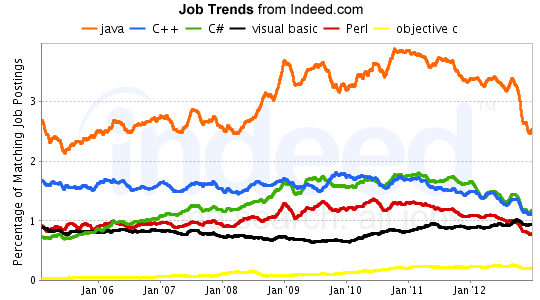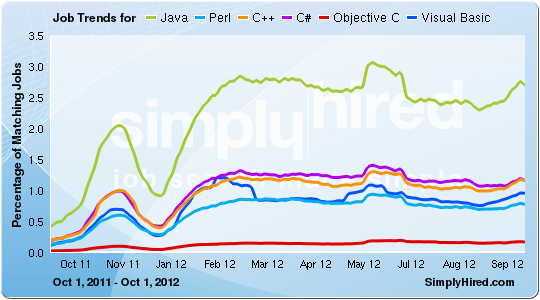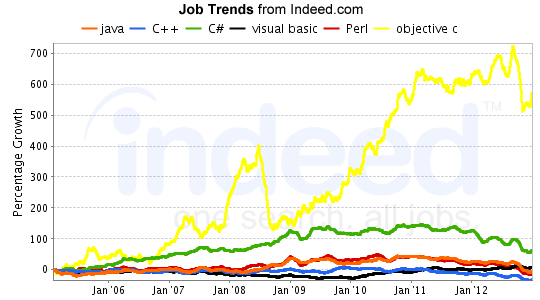Traditional Programming Language Job Trends – 2013-02
The winter edition of the job trends are back! Today, we are looking at traditional programming languages, which currently include Java, C++, C#, Objective C, Perl and Visual Basic. After this months job trends are posted, I will be reviewing all of the posts and the languages included. I believe some change is needed, so hopefully we will see some change in the summer edition. As always, please review some of the other job trends posts to see if your favorite language is already in one of these posts.
First, we look at the job trends from Indeed.com:
Most of the job trends have continued to decline for about a year. Oddly, the one language that looks to have grown during the past year was Visual Basic. VB is showing more demand now than it has in over seven years. Objective-C has a fairly flat trend for the past year, while the others show declining trends. Java shows a significant drop in the past six months, returning to job levels from 2008. Perl has dipped below Visual Basic for the first time in over six years. C# and C++ show almost identical trends and demand.
Now, let’s look at SimplyHired’s short term trends:
SimplyHired’s trends differ greatly from Indeed’s. Overall, these trends are fairly flat, with a slight rebound towards the end of last year. Objective-C does not show much growth during 2012, except at the very beginning of the year. Java leads the rebound at the end of the year, showing more growth than the other languages, but still less demand than in February 2012. C++ and C# continue their twin trends, showing almost identical demand. Perl barely stays ahead of Visual Basic, and both showing slight growth in the end. If we ignore the hiccups prior to February, all of the trends seem to be flat for the year.
Finally, here is a review of the relative scaling from Indeed, which provides an interesting perspective on relative job growth:
Surprisingly, Objective-C growth slowed significantly during the past six months. However, slowing from over 700% to about 550% is not a terrible decline. C# growth is also slowing significantly, dropping below 100% for the first time in over 4 years. Interestingly, Perl and Java are showing similar declining growth trends, with current growth dropping to the same level as 2006. Visual Basic seems to have held steady at slightly positive growth, while C++ continues to decline.
What does all this mean? There has been a definite slowdown in demand in the past year. Given the growth of mobile, this is very surprising due to the leading mobile development languages being Java and Objective-C. What we could be seeing is the true rise of web development, which allow companies to use a much greater breadth of languages than before. Java and Perl are not required knowledge when writing for the web, and the continued decline of languages like C++ and C# point to the same possible conclusion. Being a true polyglot, meaning developing in multiple languages during the same project, may soon become a requirement. We will likely see more evidence of this when we look at the web and scripting languages in the next job trends installment.
Related articles
- Does The World Still Need Visual Basic? (pluralsight.com)
- Job Trends Via Twitter Activity (i-programmer.info)
- Reflecting On Programming Language Trends (dorai.me)
Reference: Traditional Programming Language Job Trends – 2013-02 from our JCG partner Rob Diana at the Regular Geek blog.








